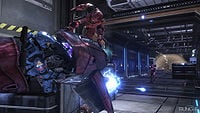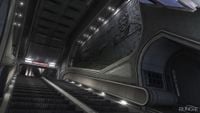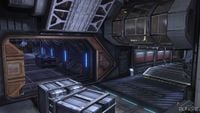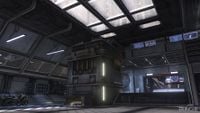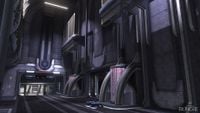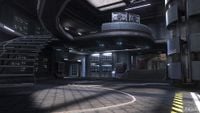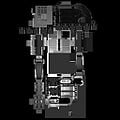Orbital: Difference between revisions
From Halopedia, the Halo wiki
(→Design) |
No edit summary |
||
| Line 40: | Line 40: | ||
Orbital takes place inside the docking-station for Quito Space Tether, a huge tower that transports cargo and people in and out of the atmosphere easily. | Orbital takes place inside the docking-station for Quito Space Tether, a huge tower that transports cargo and people in and out of the atmosphere easily. | ||
It is said to be best for asymmetrical objective games, like [[CTF]] and [[Assault]], but also has some natural deadlocks that makes [[Slayer]] interesting and [[Infection]] "terrifying". It's essentially two overlapping hallways in horseshoe shaped levels, so each team can see the other one's spawn through a window above or below them, but they are separated. Both bases of the map have | It is said to be best for asymmetrical objective games, like [[CTF]] and [[Assault]], but also has some natural deadlocks that makes [[Slayer]] interesting and [[Infection]] "terrifying". It's essentially two overlapping hallways in horseshoe shaped levels, so each team can see the other one's spawn through a window above or below them, but they are separated. Both bases of the map have operable doors that are important for objective games<ref>Game Informer December 2008</ref>. It's a multi-level map, so there are many stairways. The middle of the connecting horseshoes features a chasm which separates both sides, effectively forming a choke point that is crucial to being held, one side has a slight advantage on higher ground with a rocket launcher. While the bottom gets a sniper rifle. Orbital may be confusing at first with its long hallways all connected together by intersections and junctions, but this all adds to the strategic importance of map control. | ||
The map is located on an "empty [[UNSC]] space platform"<ref>http://www.bungie.net/News/content.aspx?type=topnews&cid=13824</ref>, more specifically, the station atop the [[Quito Space Tether]]. The map contains plaques dedicated to Doctors [[Tobias Fleming Shaw]] and [[Wallace Fujikawa]], the creators of the [[Shaw-Fujikawa Translight Engine]].<ref>Game Informer December 2008</ref>. It was reported in a Bungie Weekly Update that one part of the map has a deadly chasm, which can be easily traversed once it is "unlocked". However, this may have changed since that information was released long before the map was ever shown. Orbital has several such locks and "switches to disable and enable access to various parts of the map". Orbital has been described as cleanly beautiful, yet haunting and having signs of abrupt abandonment. | The map is located on an "empty [[UNSC]] space platform"<ref>http://www.bungie.net/News/content.aspx?type=topnews&cid=13824</ref>, more specifically, the station atop the [[Quito Space Tether]]. The map contains plaques dedicated to Doctors [[Tobias Fleming Shaw]] and [[Wallace Fujikawa]], the creators of the [[Shaw-Fujikawa Translight Engine]].<ref>Game Informer December 2008</ref>. It was reported in a Bungie Weekly Update that one part of the map has a deadly chasm, which can be easily traversed once it is "unlocked". However, this may have changed since that information was released long before the map was ever shown. Orbital has several such locks and "switches to disable and enable access to various parts of the map". Orbital has been described as cleanly beautiful, yet haunting and having signs of abrupt abandonment. | ||
Revision as of 17:29, March 4, 2009
Template:Ratings Template:Multiplayer Map Infobox
Orbital, also known by its former names, Moonbase Alpha and Space Camp, is a map that was revealed in the December 2008 issue of Game Informer.[1]. It is one of three maps to be in the Mythic Map Pack designed for Halo 3. Orbital, along with Assembly and Sandbox, has been confirmed to ship with the Limited Edition of Halo Wars February 27 - March 3, 2009, depending on world region[2].
Design
Orbital takes place inside the docking-station for Quito Space Tether, a huge tower that transports cargo and people in and out of the atmosphere easily.
It is said to be best for asymmetrical objective games, like CTF and Assault, but also has some natural deadlocks that makes Slayer interesting and Infection "terrifying". It's essentially two overlapping hallways in horseshoe shaped levels, so each team can see the other one's spawn through a window above or below them, but they are separated. Both bases of the map have operable doors that are important for objective games[3]. It's a multi-level map, so there are many stairways. The middle of the connecting horseshoes features a chasm which separates both sides, effectively forming a choke point that is crucial to being held, one side has a slight advantage on higher ground with a rocket launcher. While the bottom gets a sniper rifle. Orbital may be confusing at first with its long hallways all connected together by intersections and junctions, but this all adds to the strategic importance of map control. The map is located on an "empty UNSC space platform"[4], more specifically, the station atop the Quito Space Tether. The map contains plaques dedicated to Doctors Tobias Fleming Shaw and Wallace Fujikawa, the creators of the Shaw-Fujikawa Translight Engine.[5]. It was reported in a Bungie Weekly Update that one part of the map has a deadly chasm, which can be easily traversed once it is "unlocked". However, this may have changed since that information was released long before the map was ever shown. Orbital has several such locks and "switches to disable and enable access to various parts of the map". Orbital has been described as cleanly beautiful, yet haunting and having signs of abrupt abandonment.
Weapon Placement
Battle Rifles are common throughout the level, along with numerous plasma pistols, maulers, plasma grenades, spikers, and plasma rifles. The two main power weapon on this map are the sniper rifle and rocket launcher, but both have had their ammo decreased with the rocket only having two shots and the sniper having eight.
Equipment is also found around, bubble shields, regenerators and power drainers are put in strategic locations.
There are two Mongooses on each base, and also a ghost in one of the bases.
Skull
- Main article: Orbital Skull
The logo of the hidden skull on this level appears to have a symbol that looks like a giant fan. This symbol can be seen on the walls in several of the screen shots from the level. It has also been interpreted as the general shape of the station itself, which resembles other orbital stations in Halo canon, such as the Tiara Space Elevator or the Orbital Defense Platforms seen in Halo: Contact Harvest and Halo 2, respectively.
Trivia
- This map's codename was originally "Moonbase Alpha", then later changed to "Space Camp". The map's official name was confirmed to be "Orbital".
- There is an achievement called Post Mortem, which is to score 2 Death from the Grave medals in a single match online.
- This map was first shown in Game Informers story on Halo 3: ODST.
- This is the first map in the Halo franchise to contain escalators.
- On the new Orbital picture in Bungie.net weekly update of 12/19/08, there are several different images on the screens. The farthest to the right is the base of the Quito Space Elevator. The next screen shows a map, which may be the layout of the level. The next two screens both show Earth, but uses the image from the Halo 2 theatrical trailer, and the final screen shows the UNSC emblem.
- Bungie released new Orbital screen shots on 12/23/08. These pictures show that Orbital may be slightly bigger than one might expect, as a Ghost and Mongoose have been spotted on the map.
- Orbital is the first map in Halo 3 to be set in space. Also, through use of glitches, Orbital offers the first, and currently only, opportunity for players to experience direct exposure to space in Halo 3, except for the Valhalla Banshee glitch found only in the Halo 3 Beta. In Halo CE, Boarding Action is the only map open to space, and in Halo 2, the initial campaign level, Cairo Station, is the only area of the game which allows access to space. However, as in previous installments, players behave no differently than in atmospheric environments, i.e., exposed Elites can still breathe and Spartans and enclosed Elites do not run out of air, and there is also no microgravity effect.
Gallery
An escalator leading towards another chamber, and on the wall is the tribute to Tobias Fleming Shaw.
- Halo-3-20081222113712104.jpg
- Halo-3-20081223034044993.jpg
- Halo-3-20081223034113680.jpg
Sources
- ^ Game Informer December 2008
- ^ http://kotaku.com/5126557/ces-09-whoops-halo-wars-release-date-still-march-3
- ^ Game Informer December 2008
- ^ http://www.bungie.net/News/content.aspx?type=topnews&cid=13824
- ^ Game Informer December 2008
